Related Research Articles

Enrique José Bolaños Geyer was a Nicaraguan politician who served as President of Nicaragua from 10 January 2002 to 10 January 2007.

The Republic of Nicaragua elects on the national level a head of state—the president—and a unicameral legislature. The president of Nicaragua and his or her vice-president are elected on one ballot for a five-year term by the people.
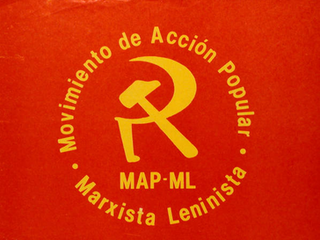
Popular Action Movement - Marxist–Leninist is a Hoxhaist communist party in Nicaragua that surged out of a split from the Sandinista National Liberation Front (FSLN) in the early 1970s. Since 1985 it is officially named the Marxist–Leninist Party of Nicaragua, but the original name MAP-ML is far more known and has been used when participating in elections.
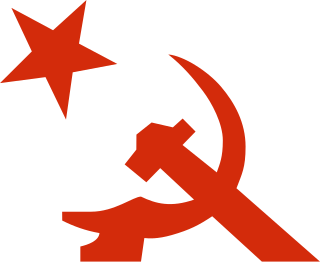
The Communist Party of Nicaragua is a communist party in Nicaragua. Founded as the Socialist Workers' Party in 1967, the core founding members were Juan Lorio, Augusto Lorío, Elí Altamirano and Manuel Pérez Estrada, who all had been expelled from the Nicaraguan Socialist Party on 23 April 1967.

General elections were held in Nicaragua on 5 November 2006. The country's voters went to the polls to elect a new President of the Republic and 90 members of the National Assembly. Daniel Ortega of the Sandinista National Liberation Front (FSLN) was elected president with 38% of the vote, defeating Eduardo Montealegre with 28%, José Rizo with 27%, Edmundo Jarquín with 6%, and Edén Pastora with 0.3%. The FSLN also emerged as the largest party in the National Assembly, winning 38 seats.
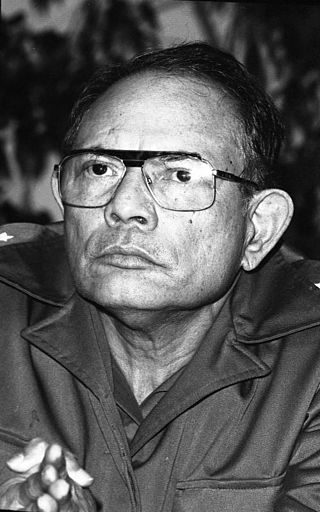
Tomás Borge Martínez, often spelled as Thomas Borge in American newspapers, was a cofounder of the Sandinista National Liberation Front in Nicaragua and was Interior Minister of Nicaragua during one of the administrations of Daniel Ortega. He was also a renowned statesman, writer, and politician. Tomás Borge also held the titles of "Vice-Secretary and President of the FSLN", member of the Nicaraguan Parliament and National Congress, and Ambassador to Peru. Considered a hardliner, he led the "prolonged people's war" tendency within the FSLN until his death.

The Nicaraguan Liberal Alliance is a political coalition in Nicaragua. It was started in 2005 by Eduardo Montealegre and other members of the Constitutional Liberal Party who opposed former President of the country Arnoldo Alemán's continued control of the PLC even after he had been found guilty of misuse of public funds, and was sentenced to 20 years in prison. Montealegre also opposed the political alliance, commonly referred to as 'El Pacto', between Alemán as head of the PLC and Daniel Ortega, head of the Sandinist National Liberation Front.
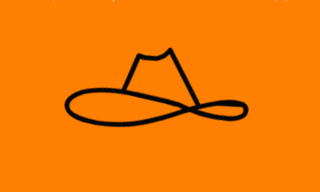
The Sandinista Renovation Movement is a Nicaraguan political party founded on 21 May 1995. It defines itself as a democratic and progressive party, made of people of all genders, that promotes the construction of a Nicaragua with opportunities, progress, solidarity, democracy, and sovereignty.

Dora María Téllez Argüello is a Nicaraguan historian known for her involvement in the Nicaraguan Revolution. As a young university medical student in León in the 1970s, Téllez was recruited by the Sandinista National Liberation Front (FSLN). Téllez went on to become a comandante and fought alongside later president Daniel Ortega in the revolution that ousted dictator Anastasio Somoza Debayle in 1979. In the subsequent FSLN government, she served as Health Minister under Ortega and has also been an advocate for women's rights. She ultimately became a critic of repression and corruption under President Ortega and left the FSLN in 1995 to found the party Sandinista Renovation Movement (MRS), later renamed Unamos. Along with several other opposition figures, she was arrested in June 2021 by the Ortega government.

General elections were held in Nicaragua on 6 November 2011. The incumbent president Daniel Ortega, won a third term in this election, with a landslide victory.
El Pueblo was a revolutionary newspaper published in Nicaragua. El Pueblo was the organ of Frente Obrero, the trade union wing of the Marxist–Leninist Popular Action Movement (MAP-ML). The newspaper began publication in March 1979.

General elections were held in Nicaragua on 6 November 2016 to elect the President, the National Assembly and members of the Central American Parliament. Incumbent President Daniel Ortega of the Sandinista National Liberation Front (FSLN) was re-elected for a third consecutive term amid charges he and the FSLN used their control of state resources to bypass constitutional term limits and hamstring political rivals. The FSLN benefited from strong economic growth and relatively low levels of crime compared to neighbouring countries.
The Superior Council for Private Enterprise is a leading business chamber in Nicaragua. As of September 2020, its president is Michael Healy, elected to a three-year term. He succeeded José Adán Aguerri, who was COSEP’s President for 13 years.

The 2018 Nicaraguan protests began on 18 April 2018 following a move by the government of Daniel Ortega to reform social security. Following the deaths of protesters, demonstrations intensified and grew into a large anti-Ortega movement seeking his removal from office.
Eli Altamirano Pérez (1934-2016) was a Nicaraguan politician and trade unionist. He served as the general secretary of the Communist Party of Nicaragua for a quarter century.
Allan Adolfo Zambrana Salmerón is a Nicaraguan lawyer, politician and trade unionist.

Carlos Domingo Cuadra Cuadra is a Nicaraguan politician and publicist. His parents were Carlos Cuadra Cardenal and Olga Cuadra Sandino. He had three sons with his wife Maria Eugenia Rodriguez called Carlos Roberto, Diego Armando and Luis Miguel Cuadra Rodriguez.

General elections were held in Nicaragua on 7 November 2021 to elect the President, the National Assembly and members of the Central American Parliament.
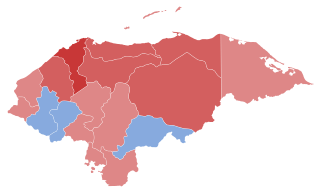
General elections were held in Honduras on 28 November 2021. Among the positions being contested was the President of Honduras, head of state and head of government of Honduras, to replace Juan Orlando Hernández from the National Party. Also up for election were the 128 deputies of the National Congress, 20 deputies to the Central American Parliament, 298 mayors and 298 vice mayors, as well as 2,092 council members.
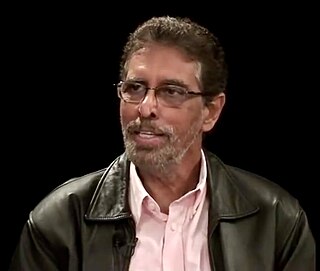
Victor Hugo Tinoco Fonseca is a Nicaraguan politician and former Sandinista guerilla. He was Deputy Minister for Foreign Affairs with the Sandinista National Liberation Front, ambassador to the United Nations and a deputy in the National Assembly. In the late 1990s he grew critical of Daniel Ortega and was expelled from the party in 2005, joining the Sandinista Renovation Movement (MRS) instead and later its successor, the Democratic Renewal Union (Unamos) party. In June 2021, he was part of a wave of arrests of opposition figures, including seven aspiring opposition candidates for president in the 2021 Nicaraguan general election.
References
- ↑ El Nuevo Diario. “Plaga” de ladrones de vehículos
- 1 2 3 La Prensa. Ortega “secuestra” al sindicalismo
- ↑ El Nuevo Diario. Ahora es otro el opio de los pueblos Archived 2018-08-04 at the Wayback Machine
- 1 2 Charles D. Ameringer (1992). Political Parties of the Americas, 1980s to 1990s: Canada, Latin America, and the West Indies. Greenwood Publishing Group. p. 463. ISBN 978-0-313-27418-3.
- ↑ UPI. Thumbnail sketches of opposition candidates
- ↑ CIDH. REPORT ON THE SITUATION OF HUMAN RIGHTS IN THE REPUBLIC OF NICARAGUA
- ↑ Manuel Jirón (1983). Pasado, presente y futuro de la libertad de expresión en Nicaragua. Ediciones Radio Amor. p. 23.
- ↑ Manuel Alcántara Sáez (1999). Sistemas políticos de América Latina. Tecnos. p. 279. ISBN 978-84-309-3437-9.
- ↑ Worker's Advocate. Managua in the summer of '85
- ↑ Nicaragua. Nicaragua-Gesellschaft. 1987. p. 23. ISBN 978-3-925290-06-0.
- ↑ Carter Center. Observing Nicaragua's Elections, 1989-1990